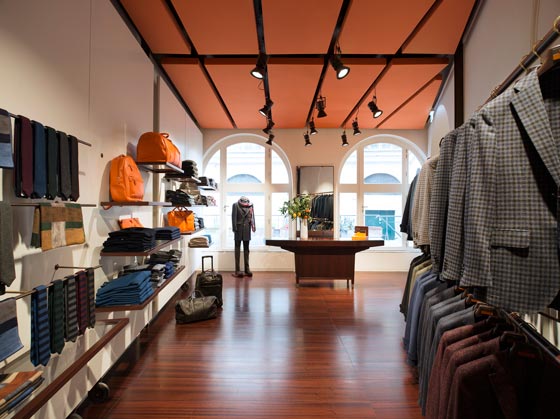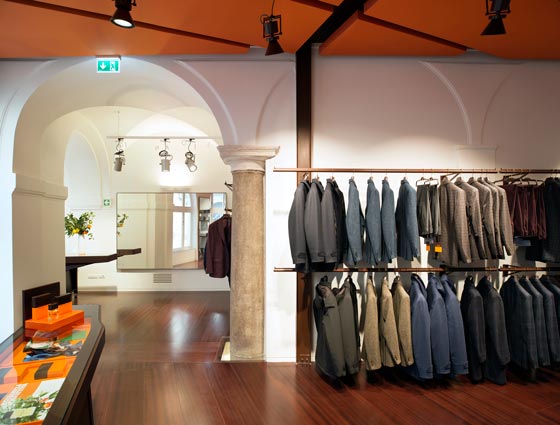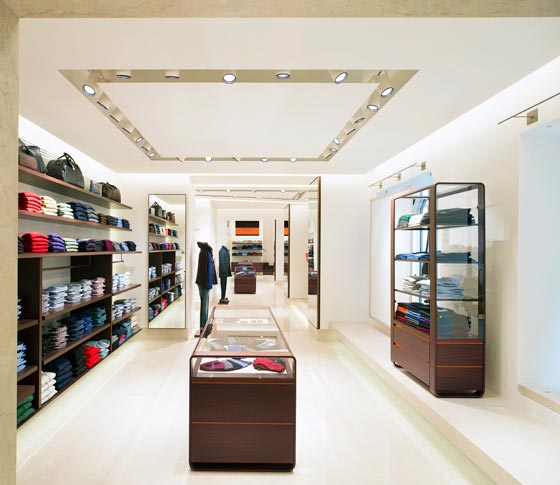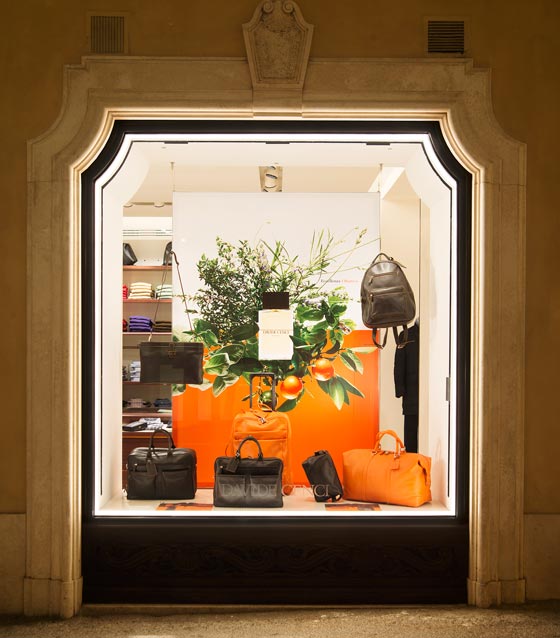
[button link=”https://www.arredanegozi.it/2016/03/davide-cenci-roma-alvisi-kirimoto/” icon=”none” target=”” color=”a30b0b” textcolor=”ffffff”]TESTO ITALIANO[/button]
With the intervention of Alvisi Kirimoto, the historic shop Davide Cenci in Rome rediscovers the tradition its modern soul.
A store of over one thousand square meters in the heart of Rome, near the Pantheon and the Chamber of Deputies, in the Campus Martius.

A flagship double-decker that, at the launch of the new fragrance of the house and the new collection “Since 1926” (designed and made directly by the company and made in Italy), has been partially restored.
Restyling and architectural design of the spaces have been entrusted to the firm of Alvisi Kirimoto, who also designed the project of the new store Davide Cenci Jr, opened in 2012 in the nearby Campus Martius. David and James Cenci have commissioned the completion of the renovation of the ground floor, begun in 2002 on the New York studio master Gabellini Sheppard Associates, and the conversion of the historic and charming area of tailoring in an area for the sale of perfume and bags bags, as well as the clothing brand of men’s clothing.
The project is based on an idea of interior design simple and functional, based on the values of the brand: tradition and innovation.

The materials are modern, well-matched to the furniture of modern restored and placed in an environment in which precious woods and color-frame the new collection “Since 1926” and the new fragrance for men and women.
Junko Kirimoto, the architect who interpreted environments by developing a thin webbing between historical memory and contemporary sensibility, says: “We started right away with the idea that the completion of the space on the ground floor were to follow the style and appearance of whole the store : tradition and innovation, clean lines, simple and elegant enhanced by the use of noble materials such as Roman botticino and mahogany. We wanted to bring out the rooms for their materiality rather than their being classic. We have removed as much as possible, doing “breathe” the walls of this historic building, eliminating any decoration and enhancing the structure.

Highlight of the store are the shopwindows. Junko Kirimoto continues: “We are very pleased that along with David and Giacomo Cenci we decided to make the windows almost a place of transition between the street and the store, emphasizing on the one hand the old frames external travertine and other interior space that, as a museum, houses the collections in the presence of signs of the past, including an ancient Roman column.
However, the most fun and challenging for us was that of the old tailor, to be disposed of because it became too small. This space has kept his soul of “workplace” with steel beams in sight, wooden floors, large wall units that turn favoring display requirements. The ceiling is made up of large panels of orange cloth that color space, a bit as once with the spools of wire used by tailors. At the same time the fabrics contribute to make a calm and peaceful atmosphere. Overall intervention defines a dynamic and informal part of the way and, through the shop, overlooking the court.

STUDIO ALVISI KIRIMOTO
After 10 years of working in collaboration with architects like Renzo Piano, Massimiliano Fuksas and Oscar Niemeyer, Massimo Alvisi and Junko Kirimoto decide to found in 2002 the architecture office Alvisi Kirimoto. Among various works in progress, stand up the Giovanni and Paolo Bulgari’s winery in San Casciano dei Bagni (Siena), new office building for Molino Casillo (Puglia), and the Aleksandrinsky Theatre interior in Saint Petersburg, Theatre of the Academy of Fine Arts in Naples, Corato Theatre(Bari), Incà complex of small and medium factories, Barletta (Bari), new hotel in Dalmine (Bergamo), Residential building, Trani (Bari), temporary pavillions for Rome’s Cinema Festival, New japanese restaurant Hamasei in Rome, Davide Cenci Store in Rome and in Milan.
Among the most important setting up the Aristaios Museum, “Il silenzio a colori” by Michelangelo Antonioni paintings, the permanent Musa, new museum for musical instruments for Accademia di S.Cecilia in the Auditorium of Rome and Salt Expò in Naples.
by AN shopfitting magazine no.131 ©
Photos courtesy Anna Galante


